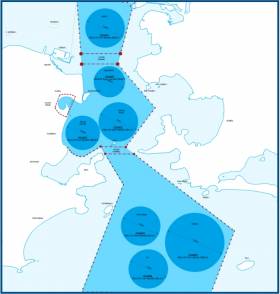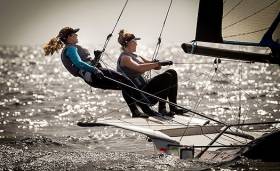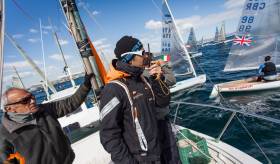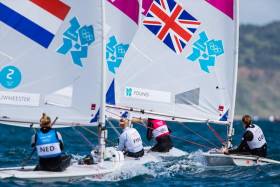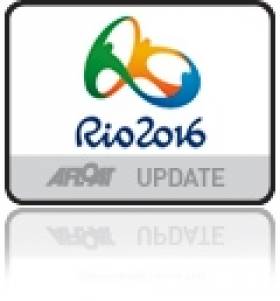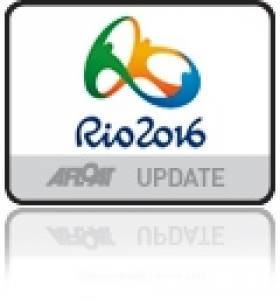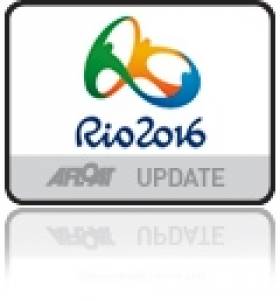Displaying items by tag: olympic sailing
Preparing to Race At Rio's Olympic Sailing Regatta
As in most yacht races, the general terms for the Olympic Regatta are set out in a Notice of Race (NoR) while the details are covered by the Sailing Instructions (SIs). Both of these have been published and are available on the World Sailing Website www.sailing.org. Like many NoRs and Sis, other documents are referenced - in the case of the Olympic Regatta there are Equipment, Competitions Area and Support Team regulations, while athletes are also bound by a Media Guide. Overarching all these are the comprehensive agreements that athletes enter into with the International Olympic Committee through their National Olympic Committees.
These documents will come under intense scrutiny, not just by sailors and their support teams as part of their normal preparation, but also by the team of officials that will be engaged in ensuring a fair competition both ashore and afloat.
For most of the sailors at this level, there should be no major surprises in the sailing instructions as they will have used these or a version of these in qualifying events, World Cups and Major Championships.
Let us catch up with an imaginary sailor as they prepare to go afloat. Their base is Marina Da Gloria in Guanabara Bay, in what is Rio's middle harbour. While waiting for flag D - the signal that they can go afloat - many sailors will first apply barrier creams to protect against sun and bacteria. Then they will visit the Omega cabin to deposit their accreditation and to collect their tracking module which they will affix to the boat so that we can follow their race progress. Once flag D is up they will proceed to their designated course area, taking care not to stray out of the competition area while also remaining clear of other course areas and official boats. Infractions of any of these area controls may incur a penalty.
Once at their designated course area, things become fairly standard for them, although not every observer will be familiar with the sound signals guns every minute in the countdown that are now used at this level. This table explains the sequence our sailor will encounter:
| Minutes Before Starting Signal | Visual Signal Displayed | Visual Signal Removed | Sound Signal | Means |
| 6 | Class flag, P or starting penalty flag (U, or Black flag) if required O flag if applicable | Class to start Starting penalty RRS P5 (RRS 42) | ||
| 5 | White flag with number 5 | One | Warning signal | |
| 4 | Blue flag with number 4 | White flag | One | Preparatory Signal |
| 3 | Pink flag with number 3 | Blue Flag | One | Three minutes |
| 2 | Red flag with number 2 | Pink Flag | One | Two minutes |
| 1 | Yellow flag with number 1 | Red Flag | One | One minute |
| 0 | Green flag | Yellow flag | One | Start signal |
| +1 | Green flag and Class flag, U or Black and O. | No Sound |
The format consists of an opening series of up to 12 races (12 in Skiffs and Windsurfers, 10 in everything else) with a maximum of three races per day and a final medal race between the top ten in each fleet after the opening series.
Thus our sailor can expect up to three consecutive races, although if the schedule is maintained it is more likely to be two a day.
While the courses are generally windward/leeward or trapezoid, there are some variations afforded to the race officer, such as final slaloms (possibly windsurfers only), inner or outer trapezoids and different finishing directions for windward/leeward courses.
Rio's location, with a large bay and open ocean close by, offers a considerable variety of course areas and seven have been designated across the three distinct areas of Inner Harbour, Middle Harbour and Ocean. Several of these offer shore viewing and all, except maybe one of the ocean courses, will be considerably influenced by the presence of the land.
Our sailor will need to be wise to the designated course for the day, and once there, will need to be keep their head out of the boat to recognise the influences exerted by wind and current on their course.
At the end of racing the sailor returns to Marina da Gloria where an extensive cleansing of boat, equipment, clothing and bodies will follow. The anti-doping team will be randomly selecting sailors for testing and once over this hurdle sailors can pick up their accreditation while returning the tracker before catching the shuttle to the Olympic Village.
Irish Olympic 49erFX sailing campaigners Andrea Brewster and Saskia Tidey have an anxious wait before next week's 47th edition of the Trofeo Princesa Sofia. The last Rio place comes up for grabs at the crunch Spanish regatta in Palma de Mallorca on March 25th. Ireland faces a tough two-boat Finnish challenge plus teams from Austria, Croatia, Estonia and Russia but Ireland, it transpires, may yet get a last minute reprieve.
The Royal Irish YC duo can escape the do–or–die regatta altogether if a much publicised Algerian entry does not materialise. Brewster and Tidey will avail of the 'reallocation' of a vacant African spot and will not have to face the fierce Euro-nation fight if there is an African 'no–show'.
No one in the Irish camp wants to tempt fate but – with less than a week to go – there is no sign of an Algerian, or indeed, any other African entry, thus apparently clearing the way for Tidey/Brewster to be declared good to go for the games.
Currently, there is no reference to the Algerian entry and Algeria is not listed as an affiliated country on the 49er and 49erFX website.
Ireland has been first in line for the African berth by virtue of Brewster and Tidey's world champioship result last December. If they do qualify it will be Ireland’s first women’s skiff entry at the Games, bringing to six the number of Irish sailors heading to Rio.
Depending on whether Algeria turns up or not, this emerging sailing nation has wisely used the fact that ISAF has introduced continental Olympic quotas for the first time and the fact that some sailing classes are completly non-existent in Africa. On paper, they appear to be the only African nation in women's 470, men's 49er, women's 49er FX and mixed Nacra 17, so they are guaranteed all of those quotas. If this transpires, they will compete in 7 out of 10 classes in Rio (11 sailors in total). To put it in perspective, Algeria has never qualified a single sailor for the Olympics before.
Wishing everyone a very Happy St Patrick's Day ☘
Northern Ireland Finn Dinghy Sailor Lies 46th at Euro Champs
Oisin McClleland of Dongahdee Sailing Club lies 46th from 90 as the last day of the Finn European Championships in Barcelona concludes today. The Northern Ireland Sailors best result of the series so far is a 26th in race four.
Yesterday's day five had it all. Anticipation, excitement, disappointment and high drama. Pieter-Jan Postma (NED) takes the overall lead for the first time and goes into the final day with a ten point lead over his training partner Josh Junior (NZL). Milan Vujasinovic (CRO) is back up to third.
Though the forecast was for a weak wind again, most of the sailors expected a nice sea breeze to come in later in the day and after a brief postponement the fleet was sent out for two races in a 6-9 knot wind that provided tricky racing and lot of mixed fortunes.
Egor Terpigorev (RUS) showed up at the the front of the fleet for the first time, leading round the top mark in Race 5 from Ben Cornish (GBR) and Postma. Cornish had a narrow lead at the gate but Postma led at the end of the next upwind to set up an exciting final leg.
Cornish explained, “I got off the start quite well and got in phase with the shifts. Then the top five or six managed to break away from the fleet and we had some really close battles. It was just a case of getting it right on the last downwind. We managed to push out to the left and the wave direction was making it easy for me to gain. I felt as if I had control out there and the last reach to the finish was really exciting. As it happened PJ and I ended up neck and neck on the line and I just managed to get the last wave across the line.” Terpigorev sailed a great race to cross in third.
With the breeze still looking good, Ioannis Mitakis (GRE) led round the top in Race 6 from Postma and Ondrej Teply (CZE). The Greek sailor held the lead until the final downwind when with the leaders well split and the wind starting to turn patchy, it was anyone's race. Jonas Høgh-Christensen (DEN) came in with the best pressure to slip round the final mark ahead of Vasilij Zbogar (SLO) and Mitakis. A sixth place for Postma was enough to retain the championship lead he had gained after the first race of the day.
Høgh-Christensen said, “The first race was super tricky. I had a bad start and the wind went left and I thought it was going to go right so I rounded in about 70 something and caught back up to 29th. The second race was much better for me. I had a good start and worked the left side of the course and came up to the first mark in fourth and I think I rounded the bottom in third. I was second at the top and ended up winning the race, so that was super.”
“They were really tricky conditions. I think there were two seas breezes fighting each other and it could go hard right or it could go left, so it was really hard to call which way it would go. I didn't get it right in the first but I did in the second.”
“The fleet here is very strong here are only a few guys missing, and people are fighting hard. It's a high scoring regatta but I'll keep on fighting.”
Cornish drops from third to fifth after a bad second race. “It was a day of two halves. To sum the week up in one word it's been difficult. The breeze has been far from simple. The gains have come in from the sides, so you really have to make sure you are 100 per cent aware of what is going to happen next. And I definitely wasn't aware in the last race, but you can't get it right all the time I guess.”
Of his expectations he said, “A top 10 would be a realistic finish for me. I finished just outside that in New Zealand at the Gold Cup and I was bit disappointed with that as I threw a bit away on the last day. I just want to put together a series that will leave me in touch with the front of the fleet.”
Also added to the mix today was the penultimate day of the US Olympic selection trials. Zach Railey (USA) and Caleb Paine (USA) were neck and neck and locked together all through Race 5, but after the discard came into effect, Paine had a ten points lead. Then in Race 6, Railey got the perfect start at the pin and looked to have the advantage.
However a poor second beat from him and a great one from Paine left them only a few boats apart at the final top mark. Then Railey got a yellow flag and on the last run they started jousting and it looked like something was going to happen. Railey then introduced a mark trap on Paine and prevented him from rounding letting about 50 boats sail past. By dragging Paine back through the fleet, Railey had forced them to both count their discards. This moved Railey back into a 10 point lead over Paine.
They ended up in the protest room so results are still provisional.
Overall leader Postma was happy to be in the lead but also mulling over the missed opportunities to be even further ahead. “It was super tricky, and very hard racing but it's going well. I am winning and my training partner Josh Junior is second, so I am very happy with that.”
On the final day he said, “In a 100 boat fleet you have a put in a good race again. You cannot play it safe. Of course I will keep an eye on which corner JJ [Junior] goes but there are other guys also in the hunt. I'll just try for a great start and play the beat and I'm looking forward to it.”
The championships will draw to close on Saturday with the final fleet race for everyone, with the warning signal time brought forward to 09.30 to make the best of the morning wind. When that has been sailed, the medal race for the top ten will be sailed as soon as possible.
With 149 days to go to the Rio 2016 Olympic Games, the British Olympic Association (BOA) announced yesterday five additional sailors from three classes selected to compete for Team GB this summer.
Nick Dempsey is set to become a five-time Olympian in Rio after the London 2012 silver medallist and Athens 2004 bronze medallist was selected for the RS:X Men's windsurfing class. If the double World Champion wins gold in Rio, he will become the most successful men's Olympic windsurfer in history.
Charlotte Dobson and Sophie Ainsworth, who finished fifth at the 2015 World Championships, will make their Olympic debuts in the 49erFX - a new event for Rio - with 2015 European Champions Ben Saxton and Nicola Groves following suit in the Nacra 17 mixed multihull event, which also sees its first Olympic Games outing this year.
The five sailors join those initially selected in September. However, from those selected in September, the BOA, in conjunction with the Royal Yachting Association, has made the difficult decision to deselect the 470 Men's pairing of Luke Patience and Elliot Willis. Due to Elliot's ongoing treatment for bowel cancer, as a two person crew, they are unfortunately unable to follow the combined training programme required to maximise their chances of success in Rio.
Selection trials in the 470 Men's event will therefore continue, with the trials in the 49er class also ongoing.
Team GB's sailing squad for Rio 2016:
Giles Scott: Finn
Nick Thompson: Laser
Alison Young: Laser Radial
Hannah Mills and Saskia Clark: 470 Women
Charlotte Dobson and Sophie Ainsworth: 49erFX
Ben Saxton and Nicola Groves: Nacra 17
Bryony Shaw: RS:X Women
Nick Dempsey: RS:X Men
Olympic Sailing Needs A Shake-Up - Is League Format The Answer?
#Olympics - Olympic sailing should look to the example of surfing in making the sport more relatable to spectators.
That's according to Mike Todd, writing for Sailing Scuttlebutt News about how a shift from traditional fleet racing to a 'Champions League' format would create much-needed buzz around the sport.
Similar to the new World Surf League, with its live-streamed races and bold personalities akin to Formula 1, Todd suggests the ISAF could develop a round-robin competition for the world's top 32 sailors to compete at events throughout the year featuring short, action-packed races.
"The positives are numerous," writes Todd, "among them being how sailors will have better name recognition."
He's not the first to suggest the league format as a shake-up for sailing, as Afloat.ie asked earlier this year if there was drive for a national sailing league in Ireland along similar lines.
Scuttlebutt Sailing News has more on the story HERE.
The National Yacht Club's Con Murphy has been selected as a race official for the Olympic Sailing Competition for Rio.
Murphy, an international race officer is the father of Irish Olympic Sailing Star Annalise Murphy, who finished fourth in Loondon 2012 and is campaigning again for Rio.
Con Murphy was Irish Olympic coach for the 1988 Olympic Games in Korea. The full list of ISAF officials appointed for Rio are in Appendix one of the pdf document downloadable below.
The Rio 2016 International Race Officers have between them 208 years of combined experience at international level. The youngest Rio 2016 race official is 33 years old and the 58 officials include a dentist, physical education teacher, wood turner and psychologist.
Just like Olympic sailors campaigning and facing a selection process international race officials also face a similar process.
This week brought to an end over two years of assessments and monitoring which included the 2014 ISAF Sailing World Championships in Santander and the Test Events for the 2016 Olympic Sailing Competition.
Led by ISAF Technical Delegates Alastair Fox and Scott Perry, the race management team will be headed by Nino Shmueli (ISR), ISAF's Principal Race Officer at the 2014 ISAF Sailing World Championships and recently at the ISAF Sailing World Cup in Qingdao. The International Jury will be chaired by Bernard Bonneau (FRA) who recently finished chairing the 2014 - 2015 Volvo Ocean Race and was the Vice-Chairman of the Olympic Jury at London 2012. Dimitris Dimou (GRE), the 470 Class Chief Measurer, will head up the ISAF equipment inspection team.
First British Sailors Selected For Rio 2016 Olympic Games
The British Olympic Association (BOA) has announced the names of the very first athletes to officially join Team GB for the Rio 2016 Olympic Games.
A total of eight athletes have been selected across six of the ten sailing events, who between them have won four Olympic medals and seven World Championship golds.
Giles Scott's is the first name to appear on the Rio teamsheet, with the 28-year-old, unbeaten in almost two years, set to make his Olympic debut in the Finn class.
Happy have been selected to represent @TeamGB for #Rio2016. 1 year out and plenty of work to do!!
— Giles Scott (@GilesScott) September 9, 2015London 2012 silver medallists Hannah Mills and Saskia Clark are paired together again in the 470 Women's class while Luke Patience, who also won silver three years ago, teams up with two-time World Champion Elliot Willis in the 470 Men's event.
Bryony Shaw, who became Britain's first female Olympic medal-winning windsurfer with bronze at Beijing 2008, is set to contest her third Olympic Games next year in the RS:X Women's event.
London 2012 Olympian Alison Young returns in the Laser Radial while 2015 Laser World Champion Nick Thompson earns his first Olympic appearance to round off the first wave of sailing selections for Rio.
British sailors have won 55 medals - including 26 golds - since sailing made its debut at Paris 1900 with Team GB topping the overall Olympic sailing medal table.
Trials for the Irish Olympic team get underway in the mens and women's Laser class this Winter.
Irish Olympic Laser Trial For 'Aquece Rio' Expected
#aquecerio – Ireland is expected to issue details of its selection trials shortly for The Aquece Rio – International Sailing Regatta 2015, the second of two Rio 2016 Olympic Test Events with the first being held in 2014.
Only one athlete per country can be represented with a major fight already on the cards between Finn Lynch and James Espey for the single Irish mens Laser slot.
Rio will welcome sailors once again from 13-22 August 2015 with racing taking place inside and outside of Guanabara Bay.
Each ISAF Member National Authority is entitled to enter one boat in each Olympic event and must apply to enter by 1 May 2015.
Sailors will compete in an opening series before Medal Races on 20, 21 and 22 August bring the regatta to a close.
Rio 2016 Olympic Sailing Competition
The Rio 2016 Olympic Sailing Competition will take place at the Marina da Glória, Rio de Janeiro, Brazil and will feature 380 athletes competing across ten events.
Racing is scheduled to take place from 8-18 August 2016 and the competition format for all events is fleet racing.
Annalise Narrowly Misses Medal Race Victory & Finishes Seventh at Miami Sailing World Cup
#SailingWCMiami – A second in Saturday's medal race gave Ireland's Annalise Murphy seventh overall at Miami Olympic classes regatta, the first International Sailing Federation (ISAF) World Cup regatta of 2015.
The Laser radial class was won by Denmark's Anne Marie Rindom. Second was Belgian Evi Van Acker with World number one Marit Boumeester of Holland third. The Irish Times has more on this HERE.
In spite of a 12-crew team in Florida, Murphy was the only Irish interest in the ten class medal race finale. Although two of three Irish Laser men made the gold fleet neither Belfast's James Espey or Dublin's Finn Lynch made the top ten medal race cut.
In fast form in 15-knots, Murphy led the race for the first lap only to lose out on a rare medal race victory to local helms woman Paige Railey, a former world champion, on the leg to the finish.
A medal race second - counting double points - was nevertheless a significant comeback for Murphy who had put together a string of top three results earlier this week to place second overall after six races on Wednesday. A change of fortune, however, saw her counting three results in the 30s in the second half of the series, dropping her to tenth overall in the 79-boat fleet on Friday.
It was a week of superlatives. Think 678 sailors, 599 boats, 150 races for ten Olympic classes and three Paralympic classes. At the ISAF Sailing World Cup Miami, presented by Sunbrella, we talked of "a racecourse built out of shifts." We spoke of competitive performances that exceeded any comparison to walking a tightrope. Dancing on a tightrope would be more to the point.
This truly is the road to the Olympics.
Every aspiring Olympic sailor takes a shot at this ISAF series that travels to the far corners of the world, qualifying gold medal winners and top continent finishers to race at the finale that follows the five-race series. The next competition will take place at Hyères, France April 20-26. The finale will take place late in 2015 at Abu Dhabi, U.A.E. It's a mini-Olympics for sailors only. You won't see faces in Rio, 2016, that you didn't see on the road to Rio, this road. You won't see racing that is any more competitive. No, just sailors hardened in this crucible, playing for the highest stakes.
This is the proving ground. And as one winner put it, on to the next one.
Irish Sailors Turn Down Invites For ISAF World Sailing Cup Final
#roadtorio – ISAF Rolex World Sailors of the Year, Olympic medallists, world champions and a Volvo Ocean Race superstar are on their way to Abu Dhabi, United Arab Emirates for the inaugural ISAF Sailing World Cup Final but two Irish Olympic sailors turned down invitations to attend due to there being 'no money in the budget' and the lateness of the ISAF decision in announcing the regatta. Neither Annalise Murphy or Ryan Seaton and Matt McGovern will compete in the UAE despite receiving invitations it was confirmed today by team manager James O'Callaghan. The Irish team is currently training in Rio.
From 26-30 November 2014 283 sailors from 39 nations with proven track records of excellence will fight it out in the Emirati capital for the right to become an ISAF Sailing World Cup Champion.
The sailors to secure their place were confirmed at the ISAF Sailing World Championships in Santander where the top ten in each event were offered a place.
'I wouldn't read too much into the Irish not going to UAE', one team insider told Afloat.ie this afternoon. 'Lots of sailors are avoiding Abu Dhabi for various reasons – while plane tickets are supplied, it will cost the technical classes money to get ancillary equipment there. Also season plans were made long ago and Abu Dhabi is too late to fit in with these', the source said.
Download the full entry list below as PDF file.
All ten Olympic events will be contested in Abu Dhabi along with an open kiteboarding event joining the fray around Lulu Island off the UAE capital's stunning Corniche. The ten Olympic events will contest an opening series and a Medal Race with the kiteboard fleet using a short track format. Prize money will be in awarded to the top three overall finishers in each of the Olympic events from a total prize purse of US$200,000.
With a maximum of just 20 boats present across the 11 ISAF Sailing World Cup Final events, the list of achievements across the board is outstanding.
Female 2014 ISAF Rolex World Sailors of the Year Martine Grael and Kahena Kunze (BRA) are just two star studded names to confirm their attendance. The Brazilians won the coveted ISAF Rolex World Sailor of the Year Award just one week ago thanks to their sublime performances across the latter part of 2013 and 2014. Over the last 18 months the Brazilians have only finished off of the 49erFX podium once and they'll be aiming to extend their run of top finishes in Abu Dhabi.
They will have their work cut out to add gold to their 2014 World and ISAF Sailing World Cup Mallorca & Hyeres titles with 2013 World Champions Alex Maloney and Molly Meech (NZL) and 2014 European Champions Ida Marie Baad Nielsen and Marie Thusgaard Olsen (DEN) within the pack.
London 2012 Women's Match Racing Olympic gold medallist Tamara Echegoyen and 2011 470 World Champion Berta Betanzos (ESP) will also compete within the 19-boat 49erFX fleet in Abu Dhabi.
2014 ISAF Rolex World Sailor of the Year nominee Charline Picon (FRA) will be a force to be reckoned with once again in the Women's RS:X as she looks to make it five regatta victories in a row. Picon blitzed the pack at the Santander 2014 ISAF Sailing World Championships and will be up for the Abu Dhabi challenge. The pack of 20 Women's RS:X racers is full of talent and Picon will certainly be hard pressed. London 2012 Olympic gold medallist Marina Alabau (ESP), silver medallist Tuuli Petaja and bronze medallist Zofia Klepacka (POL) will all be gunning for the World Cup Final title.
Volvo Ocean Race winner Franck Cammas (FRA) will sail in the Nacra 17 fleet and he'll be out to stop his compatriots Billy Besson and Marie Riou (FRA) who have dominated the class. Besson and Riou took the 2013 and 2014 Nacra 17 world titles and have eyes on the inaugural ISAF Sailing World Cup Final title. World #1 Nacra 17 pair Vittorio Bissaro and Silvia Sicouri (ITA) will also be within the 17-boat fleet.
Twenty 49er teams will be gunning for gold in Abu Dhabi. ISAF Sailing World Cup Abu Dhabi will allow the teams an opportunity to race officially within a fleet of 20 boats, the size that will be present at the Rio 2016 Olympic Sailing Competition. Strong contenders in the 49er are in the shape of Nico Delle-Karth and Nikolaus Resch (AUT), Manu Dyen and Stephane Christidis (FRA) and a trio of British racers.
Seven of the world's top ten Finn racers will be competing in Abu Dhabi. World #1 Bjorn Allansson (SWE) will be joined by World #2 Ivan Kljakovic Gaspic (CRO) and World #3 Jake Lilley (AUS). Laser Olympic bronze medallist at Athens 2004 and Olympic silver medallist at Beijing 2008 Vasilij Zbogar (SLO) will firmly be in contention for Abu Dhabi gold after a solid 18 months of Finn racing.
In the IKA Formula Kite 2014 World Champions Maxime Nocher (FRA) and Steph Bridge (GBR) will be among the racers as well as Bridge's son and 2014 European Champion Oliver Bridge (GBR).


























